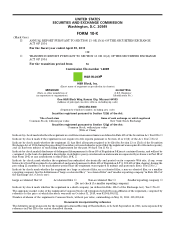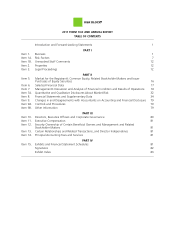HR Block 2011 Annual Report Download - page 16
Download and view the complete annual report
Please find page 16 of the 2011 HR Block annual report below. You can navigate through the pages in the report by either clicking on the pages listed below, or by using the keyword search tool below to find specific information within the annual report.HRB Bank’s operating results are subject to seasonal fluctuations primarily related to the offering of the H&R
Block Prepaid Emerald MasterCard»and Emerald Advance lines of credit, and therefore peak in January and
February and taper off through the remainder of the tax season.
COMPETITIVE CONDITIONS –We provide both retail and do-it-yourself tax preparation products and services
and face substantial competition throughout our businesses. The retail tax services business is highly competitive.
There are a substantial number of tax return preparation firms and accounting firms offering tax return
preparation services, and we face significant competition from independent tax preparers and CPAs. Certain
firms are involved in providing electronic filing services, RALs and RACs to the public. Commercial tax return
preparers and electronic filers are highly competitive with regard to price and service and many firms offer
services that may include federal and/or state returns at no charge. Additionally, certain tax return preparers were
able to offer RALs this tax season while we were not. In terms of the number of offices and personal tax returns
prepared and electronically filed in offices, online and via our software, we are one of the largest providers of tax
return preparation and electronic filing services in the U.S. We also believe we operate the largest tax return
preparation businesses in Canada and Australia.
Do-it-yourself tax preparation options include use of traditional paper forms, digital electronic forms and
various forms of digital electronic assistance, including online and desktop software both of which we offer. Our
digital tax solutions businesses compete with a number of companies. Based on tax return volumes, Intuit, Inc. is
the largest supplier of tax preparation software and online tax preparation services. Many other companies offer
digital and online services. Price and marketing competition for digital tax preparation services is intense among
value and premium products and many firms offer services that may include federal and/or state returns at no
charge.
HRB Bank provides banking services primarily to our tax clients, both retail and digital, and for many of these
clients, HRB Bank is the only provider of banking services. HRB Bank does not seek to compete broadly with
regional or national retail banks.
GOVERNMENT REGULATION –Federal legislation requires income tax return preparers to, among other
things, set forth their signatures and identification numbers on all tax returns prepared by them and retain all
tax returns prepared by them for three years. Federal laws also subject income tax return preparers to accuracy-
related penalties in connection with the preparation of income tax returns. Preparers may be prohibited from
further acting as income tax return preparers if they continuously and repeatedly engage in specified misconduct.
The federal government regulates the electronic filing of income tax returns in part by requiring electronic filers
to comply with all publications and notices of the IRS applicable to electronic filing. We are required to provide
certain electronic filing information to the taxpayer and comply with advertising standards for electronic filers. We
are also subject to possible monitoring by the IRS, penalties for improper disclosure or use of income tax return
preparation, other preparer penalties and suspension from the electronic filing program.
The Gramm-Leach-Bliley Act and related Federal Trade Commission (FTC) regulations require income tax
preparers to adopt and disclose consumer privacy policies, and provide consumers a reasonable opportunity to
“opt-out” of having personal information disclosed to unaffiliated third-parties for marketing purposes. Some
states have adopted or proposed strict “opt-in” requirements in connection with use or disclosure of consumer
information. In addition, the IRS generally prohibits the use or disclosure by tax return preparers of taxpayer
information without the prior written consent of the taxpayer.
Certain states have regulations and requirements relating to offering income tax courses. These requirements
include licensing, bonding and certain restrictions on advertising.
The IRS published final regulations in September 2010 that: (1) require all tax return preparers to use a Preparer
Tax Identification Number (PTIN) as their identifying number on federal tax returns filed after December 31, 2010;
(2) require all tax return preparers to be authorized to practice before the IRS as a prerequisite to obtaining or
renewing a PTIN; (3) caused all previously issued PTINs to expire on December 31, 2010 unless properly renewed;
(4) allow the IRS to conduct tax compliance checks on tax return preparers; (5) define the individuals who are
considered “tax return preparers” for the PTIN requirement, and (6) set the amount of the PTIN user registration
fee at $64.25 per year. The IRS is also conducting background checks on PTIN applicants. The IRS plans to review
the amount of the PTIN user registration fee in the summer of 2011 and may adjust the fee amount. The IRS also
published final regulations implementing the individual e-file mandate in March 2011.
Other changes are expected to be finalized in calendar year 2011. These include changes to: (1) establish a new
class of practitioners who are authorized to practice before the IRS under Circular 230, called “registered tax
return preparers” who would be required to (a) pass a competency examination as a prerequisite to becoming a
registered tax return preparer, (b) complete annual continuing professional education requirements, and
(c) comply with ethical standards; (2) revise the amount of the enrolled agent application and renewal fee;
(3) set the amount of a sponsor fee for qualified continuing professional education sponsors; (4) set the amount of
4H&R BLOCK 2011 Form 10K
























